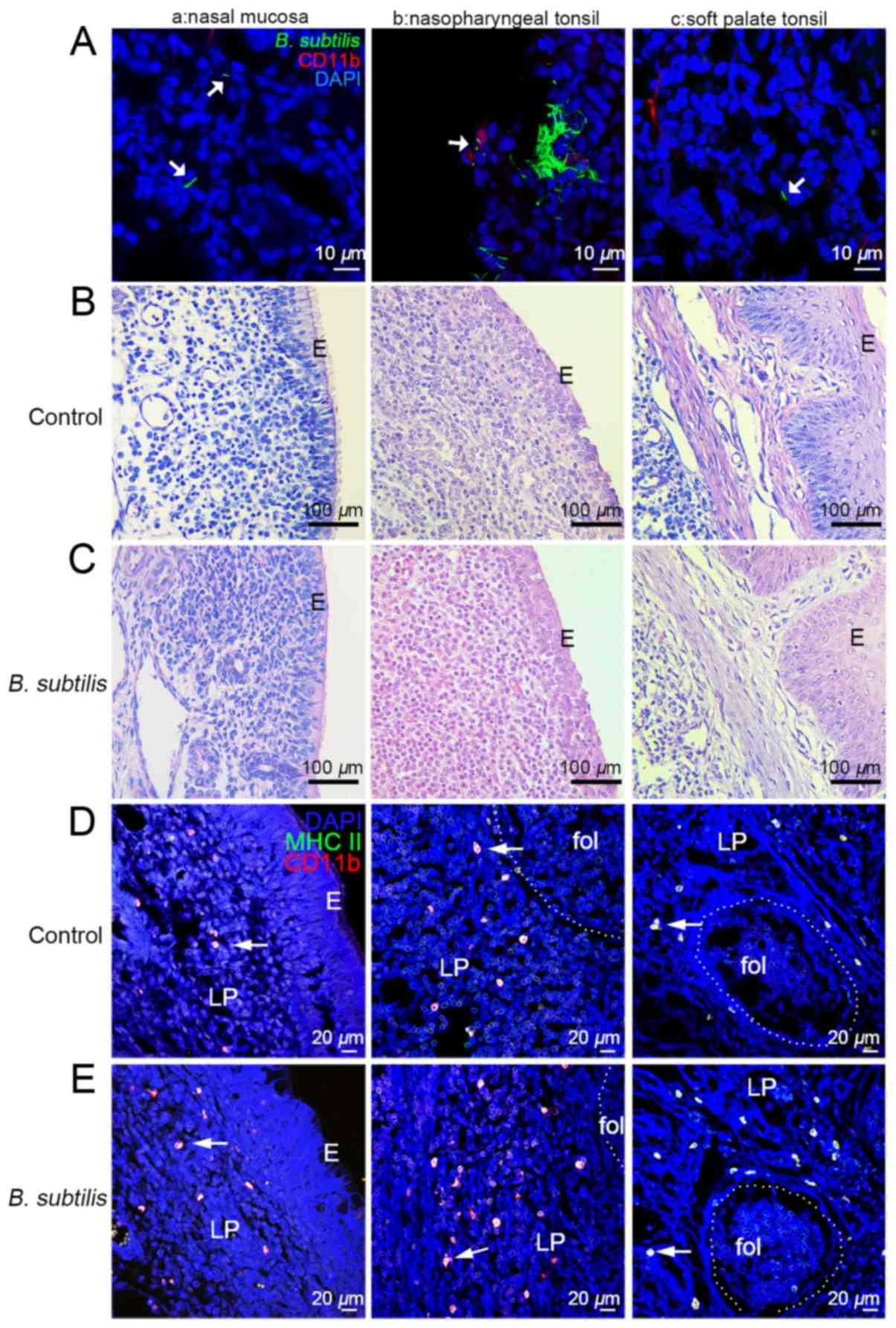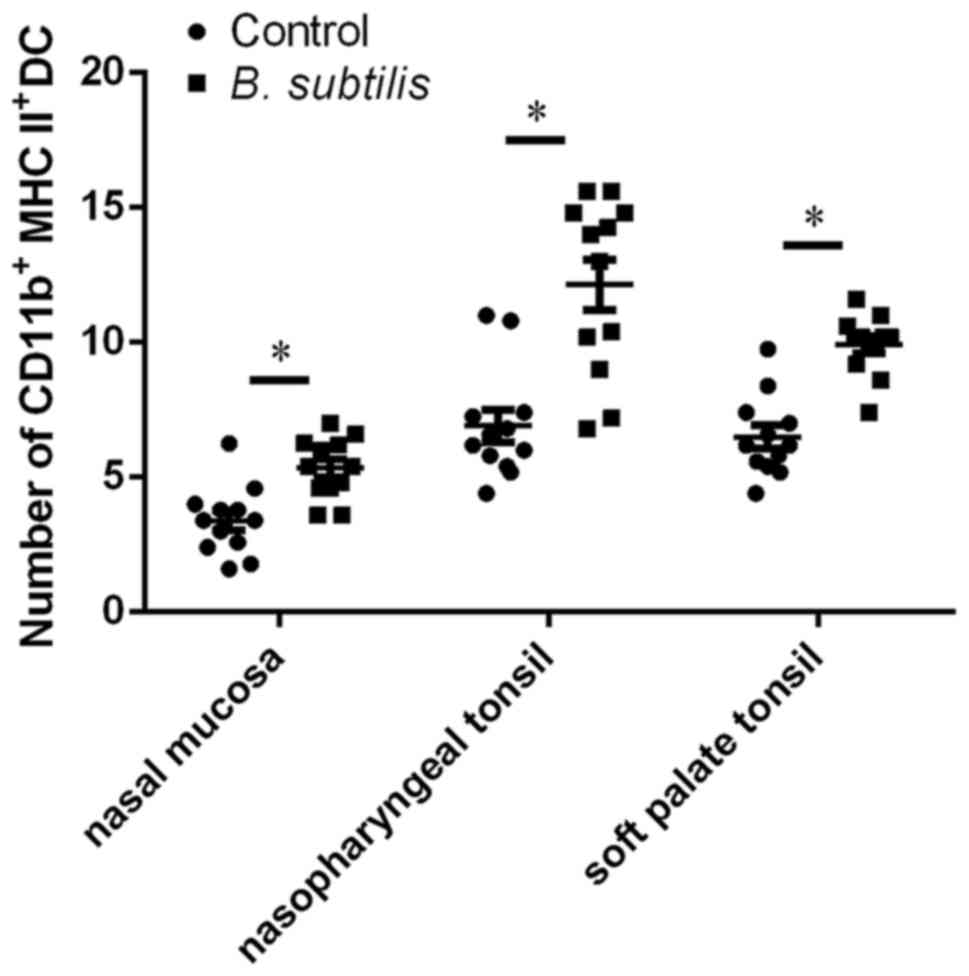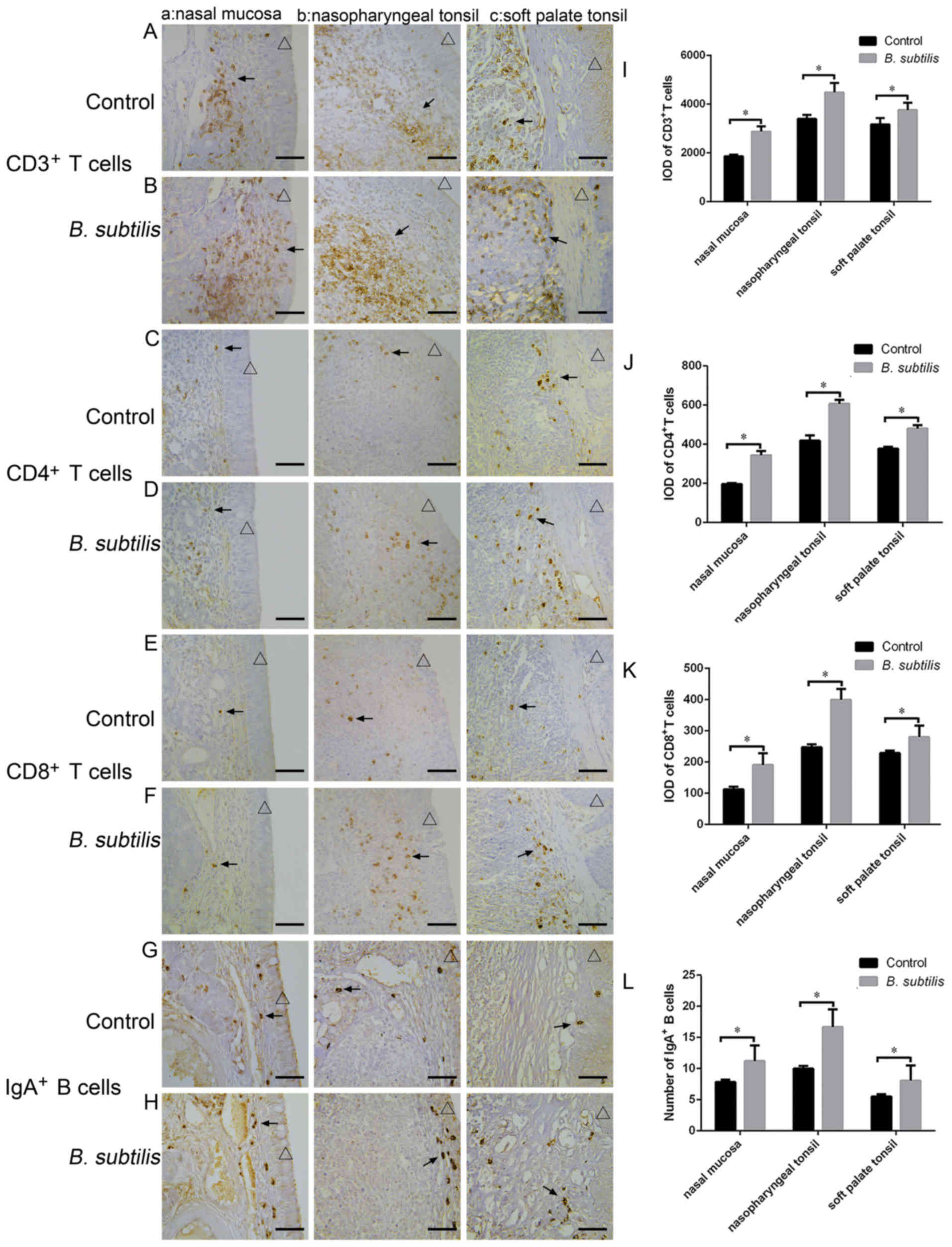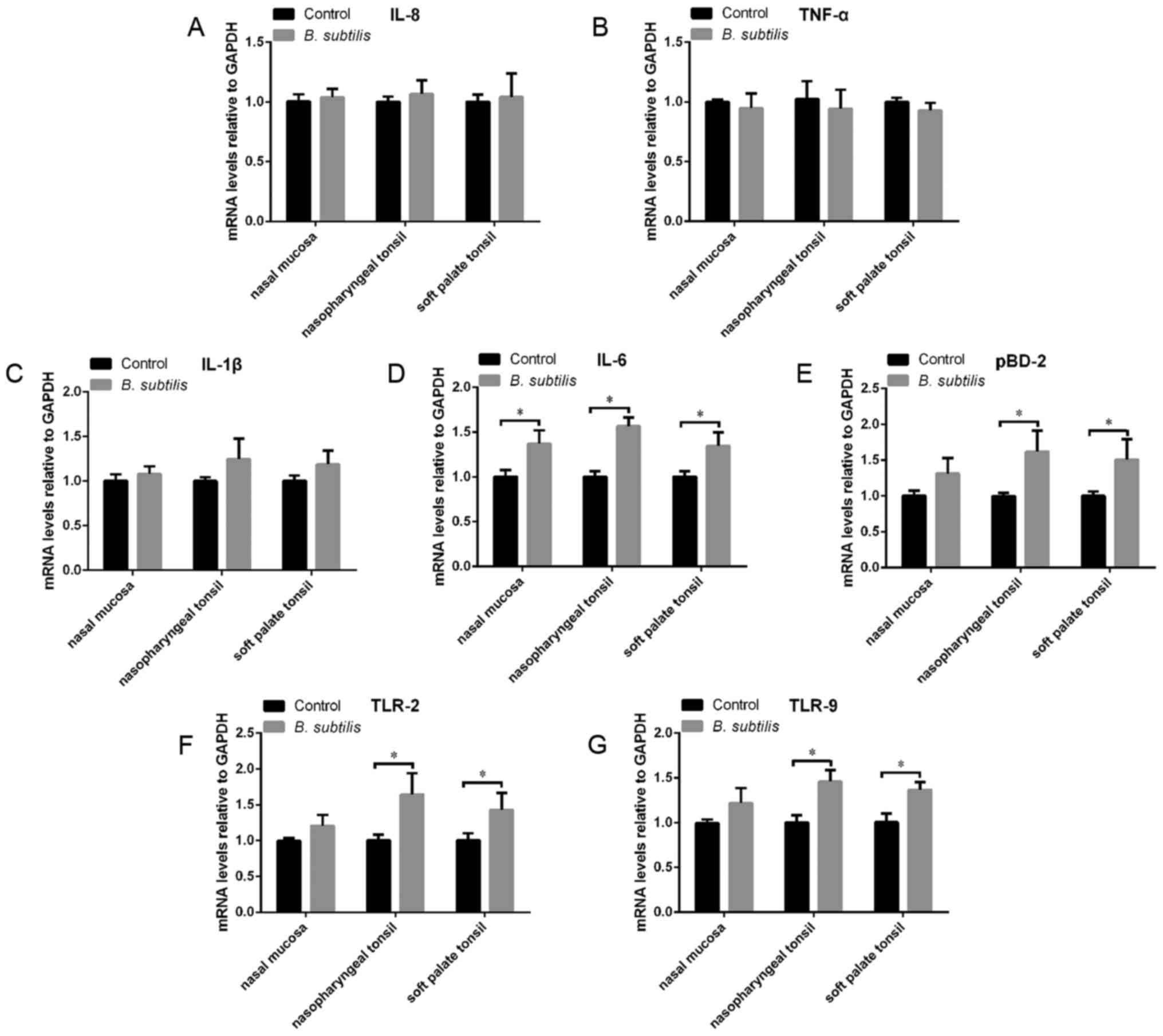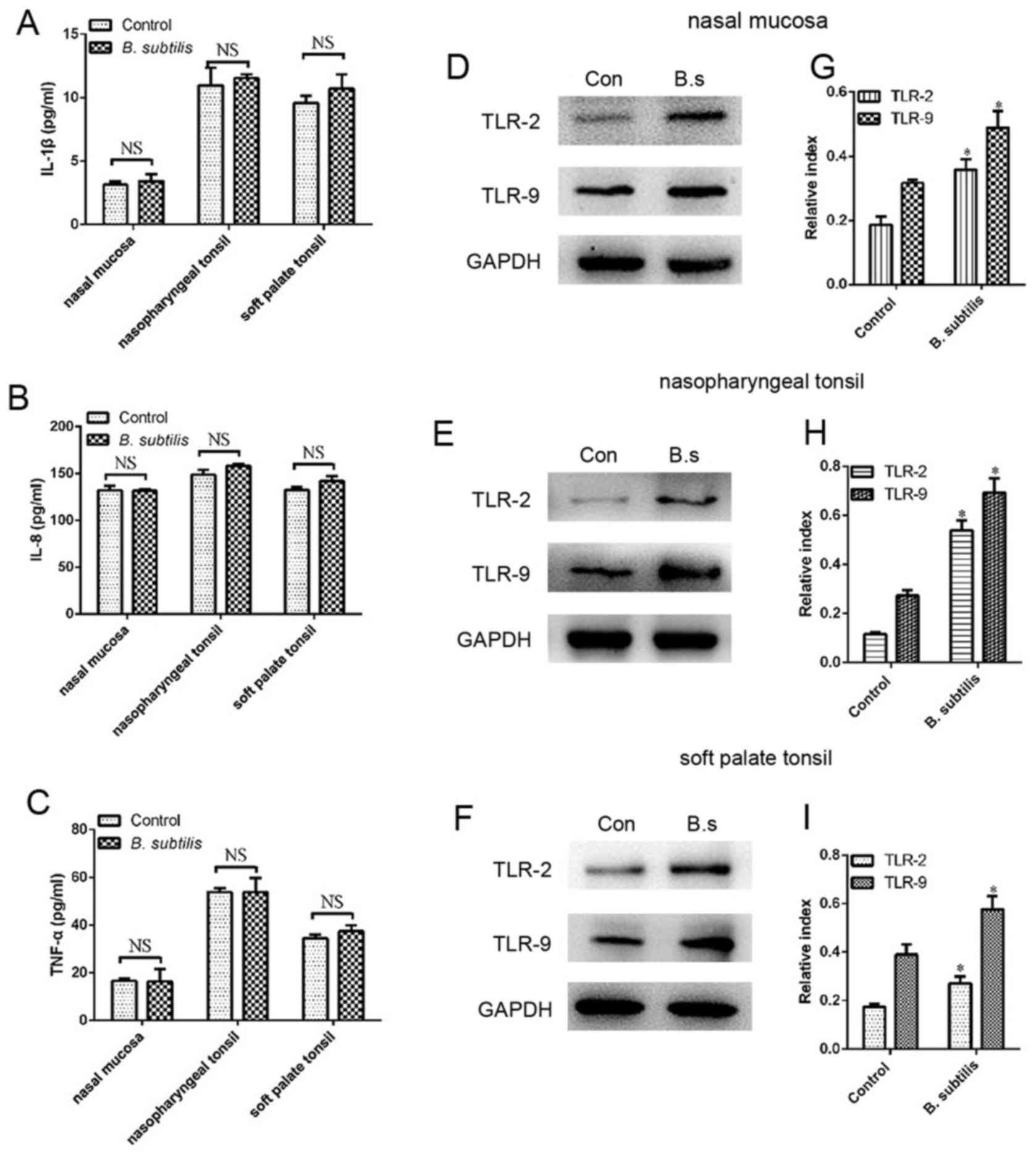|
1
|
Meng Y, Yang Y, Lu W, Wang Y, Qian F, Wang
X, Zhang Z and Wang W: The inhibition of Platycodin D on Mycoplasma
pneumoniae proliferation and its effect on promoting cell growth
after anti-Mycoplasma pneumoniae treatment. Front Cell Infect
Microbiol. 4:1922015. View Article : Google Scholar : PubMed/NCBI
|
|
2
|
Kim TK, Bheda-Malge A, Lin Y, Sreekrishna
K, Adams R, Robinson MK, Bascom CC, Tiesman JP, Isfort RJ and
Gelinas R: A systems approach to understanding human rhinovirus and
influenza virus infection. Virology. 486:146–157. 2015. View Article : Google Scholar : PubMed/NCBI
|
|
3
|
Persson J, Zhang Y, Olafsdottir TA, Thörn
K, Cairns TM, Wegmann F, Sattentau QJ, Eisenberg RJ, Cohen GH and
Harandi AM: Nasal immunization confers high avidity neutralizing
antibody response and immunity to primary and recurrent genital
herpes in guinea pigs. Front Immunol. 7:6402016. View Article : Google Scholar : PubMed/NCBI
|
|
4
|
Yang J, Dai L, Yu QH and Yang Q:
Histological and anatomical structure of the nasal cavity of Bama
minipigs. PLoS One. 12:e01739022017. View Article : Google Scholar : PubMed/NCBI
|
|
5
|
Amuguni H, Lee S, Kerstein K, Brown D,
Belitsky B, Herrmann J, Keusch G, Sonenshein A and Tzipori S:
Sublingual immunization with an engineered Bacillus subtilis strain
expressing tetanus toxin fragment C induces systemic and mucosal
immune responses in piglets. Microbes Infect. 14:447–456. 2012.
View Article : Google Scholar : PubMed/NCBI
|
|
6
|
Hellings P, Jorissen M and Ceuppens JL:
The Waldeyer's ring. Acta Otorhinolaryngol Belg. 54:237–241.
2000.PubMed/NCBI
|
|
7
|
Casteleyn C, Breugelmans S, Simoens P and
Van den Broeck W: The tonsils revisited: Review of the anatomical
localization and histological characteristics of the tonsils of
domestic and laboratory animals. Clin Dev Immunol. 2011:4724602011.
View Article : Google Scholar : PubMed/NCBI
|
|
8
|
Cisney ED, Fernandez S, Hall SI, Krietz GA
and Ulrich RG: Examining the role of nasopharyngeal-associated
lymphoreticular tissue (NALT) in mouse responses to vaccines. J Vis
Exp: 3960. 2012. View
Article : Google Scholar
|
|
9
|
Casteleyn C, Broos AM, Simoens P and Van
den Broeck W: NALT (nasal cavity-associated lymphoid tissue) in the
rabbit. Vet Immunol Immunopathol. 133:212–218. 2010. View Article : Google Scholar : PubMed/NCBI
|
|
10
|
Pabst R: Mucosal vaccination by the
intranasal route. Nose-associated lymphoid tissue (NALT)-Structure,
function and species differences. Vaccine. 33:4406–4413. 2015.
View Article : Google Scholar : PubMed/NCBI
|
|
11
|
Brandtzaeg P and Pabst R: Let's go
mucosal: Communication on slippery ground. Trends Immunol.
25:570–577. 2004. View Article : Google Scholar : PubMed/NCBI
|
|
12
|
Khaiboullina SF, Morzunov SP, Hall MR, De
Meirleir KL, Rizvanov AA and Lombardi VC: Human dendritic cells
transfected with a human papilloma virus-18 construct display
decreased mobility and upregulated cytokine production. Int J
Oncol. 43:1701–1709. 2013. View Article : Google Scholar : PubMed/NCBI
|
|
13
|
Rate A, Bosco A, McKenna KL, Holt PG and
Upham JW: Airway epithelial cells condition dendritic cells to
express multiple immune surveillance genes. PLoS One. 7:e449412012.
View Article : Google Scholar : PubMed/NCBI
|
|
14
|
Nakahara T, Moroi Y, Uchi H and Furue M:
Differential role of MAPK signaling in human dendritic cell
maturation and Th1/Th2 engagement. J. Dermatol Sci. 42:1–11. 2006.
View Article : Google Scholar
|
|
15
|
Jamin A, Gorin S, Le Potier MF and
Kuntz-Simon G: Characterization of conventional and plasmacytoid
dendritic cells in swine secondary lymphoid organs and blood. Vet
Immunol Immunopathol. 114:224–237. 2006. View Article : Google Scholar : PubMed/NCBI
|
|
16
|
Fijan S: Microorganisms with claimed
probiotic properties: An overview of recent literature. Int J
Environ Res Public Health. 11:4745–4767. 2014. View Article : Google Scholar : PubMed/NCBI
|
|
17
|
Galdeano CM, de Moreno de LeBlanc A,
Vinderola G, Bonet ME and Perdigón G: Proposed model: Mechanisms of
immunomodulation induced by probiotic bacteria. Clin Vaccine
Immunol. 14:485–492. 2007. View Article : Google Scholar : PubMed/NCBI
|
|
18
|
Toure Y, Ongena M, Jacques P, Guiro A and
Thonart P: Role of lipopeptides produced by Bacillus subtilis GA1
in the reduction of grey mould disease caused by Botrytis cinerea
on apple. J Appl Microbiol. 96:1151–1160. 2004. View Article : Google Scholar : PubMed/NCBI
|
|
19
|
Huang JM, La Ragione RM, Nunez A and
Cutting SM: Immunostimulatory activity of Bacillus spores. FEMS
Immunol Med Microbiol. 53:195–203. 2008. View Article : Google Scholar : PubMed/NCBI
|
|
20
|
Liang J, Fu J, Kang H, Lin J, Yu Q and
Yang Q: Comparison of 3 kinds of Toll-like receptor ligands for
inactivated avian H5N1 influenza virus intranasal immunization in
chicken. Poult Sci. 92:2651–2660. 2013. View Article : Google Scholar : PubMed/NCBI
|
|
21
|
Song M, Hong HA, Huang JM, Colenutt C,
Khang DD, Nguyen TV, Park SM, Shim BS, Song HH, Cheon IS, et al:
Killed Bacillus subtilis spores as a mucosal adjuvant for an H5N1
vaccine. Vaccine. 30:3266–3277. 2012. View Article : Google Scholar : PubMed/NCBI
|
|
22
|
Mou C, Zhu L, Yang J, Xu W, Cheng X and
Yang Q: Immune responses induced by recombinant Bacillus subtilis
expressing the hemagglutinin protein of H5N1 in chickens. Sci Rep.
6:384032016. View Article : Google Scholar : PubMed/NCBI
|
|
23
|
Upadhaya SD, Shanmugam SK, Kang DK and Kim
IH: Preliminary assessment on potentials of probiotic B. subtilis
RX7 and B. methylotrophicus C14 strains as an immune modulator in
Salmonella-challenged weaned pigs. Trop Anim Health Prod.
49:1065–1070. 2017. View Article : Google Scholar : PubMed/NCBI
|
|
24
|
Zhang W, Zhu YH, Zhou D, Wu Q, Song D,
Dicksved J and Wang JF: Oral administration of a select mixture of
Bacillus probiotics affects the gut microbiota and goblet cell
function following Escherichia coli challenge in newly weaned pigs
of genotype MUC4 that are supposed to be enterotoxigenic E. coli
F4ab/ac receptor negative. Appl Environ Microbiol. 83:pii: e02747.
–16. 2017. View Article : Google Scholar
|
|
25
|
Sheng QK, Zhou KF, Hu HM, Zhao HB, Zhang Y
and Ying W: Effect of Bacillus subtilis natto on meat quality and
skatole content in TOPIGS pigs. Asian-Australas J Anim Sci.
29:716–721. 2016. View Article : Google Scholar : PubMed/NCBI
|
|
26
|
Shi C, Zhang Y, Lu Z and Wang Y:
Solid-state fermentation of corn-soybean meal mixed feed with
Bacillus subtilis and Enterococcus faecium for degrading
antinutritional factors and enhancing nutritional value. J Anim Sci
Biotechnol. 8:502017. View Article : Google Scholar : PubMed/NCBI
|
|
27
|
Deng J, Li Y, Zhang J and Yang Q:
Co-administration of Bacillus subtilis RJGP16 and Lactobacillus
salivarius B1 strongly enhances the intestinal mucosal immunity of
piglets. Res Vet Sci. 94:62–68. 2013. View Article : Google Scholar : PubMed/NCBI
|
|
28
|
Khoufache K, Cabaret O, Farrugia C,
Rivollet D, Alliot A, Allaire E, Cordonnier C, Bretagne S and
Botterel F: Primary in vitro culture of porcine tracheal epithelial
cells in an air-liquid interface as a model to study airway
epithelium and Aspergillus fumigatus interactions. Med Mycol.
48:1049–1055. 2010. View Article : Google Scholar : PubMed/NCBI
|
|
29
|
Livak KJ and Schmittgen TD: Analysis of
relative gene expression data using real-time quantitative PCR and
the 2(-Delta Delta C(T)) method. Methods. 25:402–408. 2001.
View Article : Google Scholar : PubMed/NCBI
|
|
30
|
Loving CL, Osorio FA, Murtaugh MP and
Zuckermann FA: Innate and adaptive immunity against porcine
reproductive and respiratory syndrome virus. Vet Immunol
Immunopathol. 167:1–14. 2015. View Article : Google Scholar : PubMed/NCBI
|
|
31
|
Tu S, Zhong D, Xie W, Huang W, Jiang Y and
Li Y: Role of toll-like receptor signaling in the pathogenesis of
graft-versus-host diseases. Int J Mol Sci. 17:pii: E1288. 2016.
View Article : Google Scholar
|
|
32
|
Romo MR, Pérez-Martinez D and Ferrer
Castillo C: Innate immunity in vertebrates: An overview.
Immunology. 148:125–139. 2016. View Article : Google Scholar : PubMed/NCBI
|
|
33
|
Zhang EJ and Lu MJ: Toll-like receptor
(TLR)-mediated innate immune responses in the control of hepatitis
B virus (HBV) infection. Med. Microbiol Immunol. 204:11–20. 2015.
View Article : Google Scholar
|
|
34
|
Modlin RL: Mammalian toll-like receptors.
Ann Allerg Asthma Immunol. 88:543–548. 2002. View Article : Google Scholar
|
|
35
|
Giordani L, Sanchez M, Libri I, Quaranta
MG, Mattioli B and Viora M: IFN-α amplifies human naive B cell
TLR-9-mediated activation and Ig production. J Leukocyte Biol.
86:261–271. 2009. View Article : Google Scholar : PubMed/NCBI
|
|
36
|
Luo Q, Cui HM, Peng X, Fang J, Zuo Z, Deng
J, Liu J and Deng Y: Intestinal IgA+ cell numbers as well as IgA,
IgG, and IgM contents correlate with mucosal humoral immunity of
broilers during supplementation with high fluorine in the diets.
Biol Trace Elem Res. 154:62–72. 2013. View Article : Google Scholar : PubMed/NCBI
|
|
37
|
Wu B, Cui H, Peng X, Fang J, Zuo Z, Deng J
and Huang J: Toxicological effects of nickel chloride on IgA+ B
cells and sIgA, IgA, IgG, IgM in the intestinal mucosal immunity in
broilers. Int J Environ Res Public Health. 11:8175–8192. 2014.
View Article : Google Scholar : PubMed/NCBI
|
|
38
|
Gao Q, Zhao S, Qin T, Yin Y, Yu Q and Yang
Q: Effects of inactivated porcine epidemic diarrhea virus on
porcine monocyte-derived dendritic cells and intestinal dendritic
cells. Res Vet Sci. 106:149–158. 2016. View Article : Google Scholar : PubMed/NCBI
|
|
39
|
Durand M and Segura E: Dendritic cell
subset purification from human tonsils and lymph nodes. Methods Mol
Biol. 1423:89–99. 2016. View Article : Google Scholar : PubMed/NCBI
|
|
40
|
Fukuyama Y, Tokuhara D, Sekine S, Kataoka
K, Markham JD, Irwin AR, Moon GH, Tokuhara Y, Fujihashi K, Davydova
J, et al: Notch-ligand expression by NALT dendritic cells regulates
mucosal Th1- and Th2-type responses. Biochem Biophys Res Commun.
418:6–11. 2012. View Article : Google Scholar : PubMed/NCBI
|
|
41
|
Qin T, Yin Y, Wang X, Liu H, Lin J, Yu Q
and Yang Q: Whole inactivated avian Influenza H9N2 viruses induce
nasal submucosal dendritic cells to sample luminal viruses via
transepithelial dendrites and trigger subsequent DC maturation.
Vaccine. 33:1382–1392. 2015. View Article : Google Scholar : PubMed/NCBI
|
|
42
|
Rajan Sundara S and Longhi MP: Dendritic
cells and adipose tissue. Immunology. 149:353–361. 2016. View Article : Google Scholar : PubMed/NCBI
|
|
43
|
Lammers A, Wieland WH, Kruijt L, Jansma A,
Straetemans T, Schots A, den Hartog G and Parmentier HK: Successive
immunoglobulin and cytokine expression in the small intestine of
juvenile chicken. Dev Comp Immunol. 34:1254–1262. 2010. View Article : Google Scholar : PubMed/NCBI
|
|
44
|
Moutsopoulos NM, Nares S, Nikitakis N,
Rangel Z, Wen J, Munson P, Sauk J and Wahl SM: Tonsil epithelial
factors may influence oropharyngeal human immunodeficiency virus
transmission. Am J Pathol. 171:571–579. 2007. View Article : Google Scholar : PubMed/NCBI
|
|
45
|
Zhang J, Deng J, Li Y and Yang Q: The
effect of Lactobacillus on the expression of porcine β-defensin-2
in the digestive tract of piglets. Livestock Sci. 138:259–265.
2011. View Article : Google Scholar
|
|
46
|
Zhou D, Zhu YH, Zhang W, Wang ML, Fan WY,
Song D, Yang GY, Jensen BB and Wang JF: Oral administration of a
select mixture of Bacillus probiotics generates Tr1 cells in weaned
F4ab/acR-pigs challenged with an F4+ ETEC/VTEC/EPEC strain. Vet
Res. 46:952015. View Article : Google Scholar : PubMed/NCBI
|
|
47
|
Cilieborg MS, Thymann T, Siggers R, Boye
M, Bering SB, Jensen BB and Sangild PT: The incidence of
necrotizing enterocolitis is increased following probiotic
administration to preterm pigs. J Nutr. 141:223–230. 2011.
View Article : Google Scholar : PubMed/NCBI
|
|
48
|
Li Y, Xu Q, Huang Z, Lv L, Liu X, Yin C,
Yan H and Yuan J: Effect of Bacillus subtilis CGMCC 1.1086 on the
growth performance and intestinal microbiota of broilers. J Appl
Microbiol. 120:195–204. 2016. View Article : Google Scholar : PubMed/NCBI
|
|
49
|
Thirabunyanon M and Thongwittaya N:
Protection activity of a novel probiotic strain of Bacillus
subtilis against Salmonella Enteritidis infection. Res Vet Sci.
93:74–81. 2012. View Article : Google Scholar : PubMed/NCBI
|















